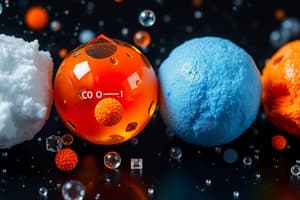Podcast
Questions and Answers
What is defined as anything that occupies space and has mass?
What is defined as anything that occupies space and has mass?
- Weight
- Energy
- Volume
- Matter (correct)
How is mass measured?
How is mass measured?
- In joules
- In liters and milliliters
- In meters and centimeters
- In grams and kilograms (correct)
What determines an object's mass?
What determines an object's mass?
- The color of the object
- The number and kind of atoms (correct)
- The temperature of the object
- The volume of the object
Which of the following correctly describes solids?
Which of the following correctly describes solids?
Which statement about liquids is true?
Which statement about liquids is true?
What happens to the particles of a liquid when it is heated?
What happens to the particles of a liquid when it is heated?
What is volume in terms of matter?
What is volume in terms of matter?
What characterizes the behavior of gas particles?
What characterizes the behavior of gas particles?
What is true about the mass of an object?
What is true about the mass of an object?
Which property distinguishes solids from liquids?
Which property distinguishes solids from liquids?
What happens to the volume of a liquid when poured into a different container?
What happens to the volume of a liquid when poured into a different container?
How do substances in the gaseous state behave compared to solids and liquids?
How do substances in the gaseous state behave compared to solids and liquids?
What best describes the effect of heating a liquid on its particles?
What best describes the effect of heating a liquid on its particles?
What unit is typically used to measure the volume of liquids?
What unit is typically used to measure the volume of liquids?
Which statement about the composition of matter is correct?
Which statement about the composition of matter is correct?
What characteristic do all forms of matter share?
What characteristic do all forms of matter share?
Flashcards are hidden until you start studying
Study Notes
Understanding Matter
- Matter is defined as anything that occupies space and has mass.
- Mass measures the amount of matter in an object and remains constant regardless of location.
- Units of mass include grams (g), kilograms (kg), and milligrams (mg).
Properties of Mass
- Mass determines how heavy an object is; a bowling ball has more mass than a feather.
- Mass is independent of gravity and does not change with the object's position.
Volume of Matter
- Volume refers to the space occupied by an object; a larger mass generally leads to greater volume.
- Liquid volume can be measured in liters, milliliters, ounces, quarts, and cubic meters.
States of Matter
- Matter exists in three primary states: solids, liquids, and gases, each with distinct particle behaviors.
- Solids maintain a fixed shape due to closely packed particles locked in place, allowing only vibration.
Properties of Solids
- Solids cannot be compressed or change shape; examples include coins, books, and erasers.
- The particles in solids are arranged in fixed positions, contributing to their rigidity.
Properties of Liquids
- Liquids have a definite volume but take the shape of their containers.
- When pouring a liquid, its volume remains unchanged despite the change in shape.
- Liquid particle movement is influenced by energy; heating a liquid increases particle speed.
Understanding Matter
- Matter is defined as anything that occupies space and has mass.
- Mass measures the amount of matter in an object and remains constant regardless of location.
- Units of mass include grams (g), kilograms (kg), and milligrams (mg).
Properties of Mass
- Mass determines how heavy an object is; a bowling ball has more mass than a feather.
- Mass is independent of gravity and does not change with the object's position.
Volume of Matter
- Volume refers to the space occupied by an object; a larger mass generally leads to greater volume.
- Liquid volume can be measured in liters, milliliters, ounces, quarts, and cubic meters.
States of Matter
- Matter exists in three primary states: solids, liquids, and gases, each with distinct particle behaviors.
- Solids maintain a fixed shape due to closely packed particles locked in place, allowing only vibration.
Properties of Solids
- Solids cannot be compressed or change shape; examples include coins, books, and erasers.
- The particles in solids are arranged in fixed positions, contributing to their rigidity.
Properties of Liquids
- Liquids have a definite volume but take the shape of their containers.
- When pouring a liquid, its volume remains unchanged despite the change in shape.
- Liquid particle movement is influenced by energy; heating a liquid increases particle speed.
Studying That Suits You
Use AI to generate personalized quizzes and flashcards to suit your learning preferences.




